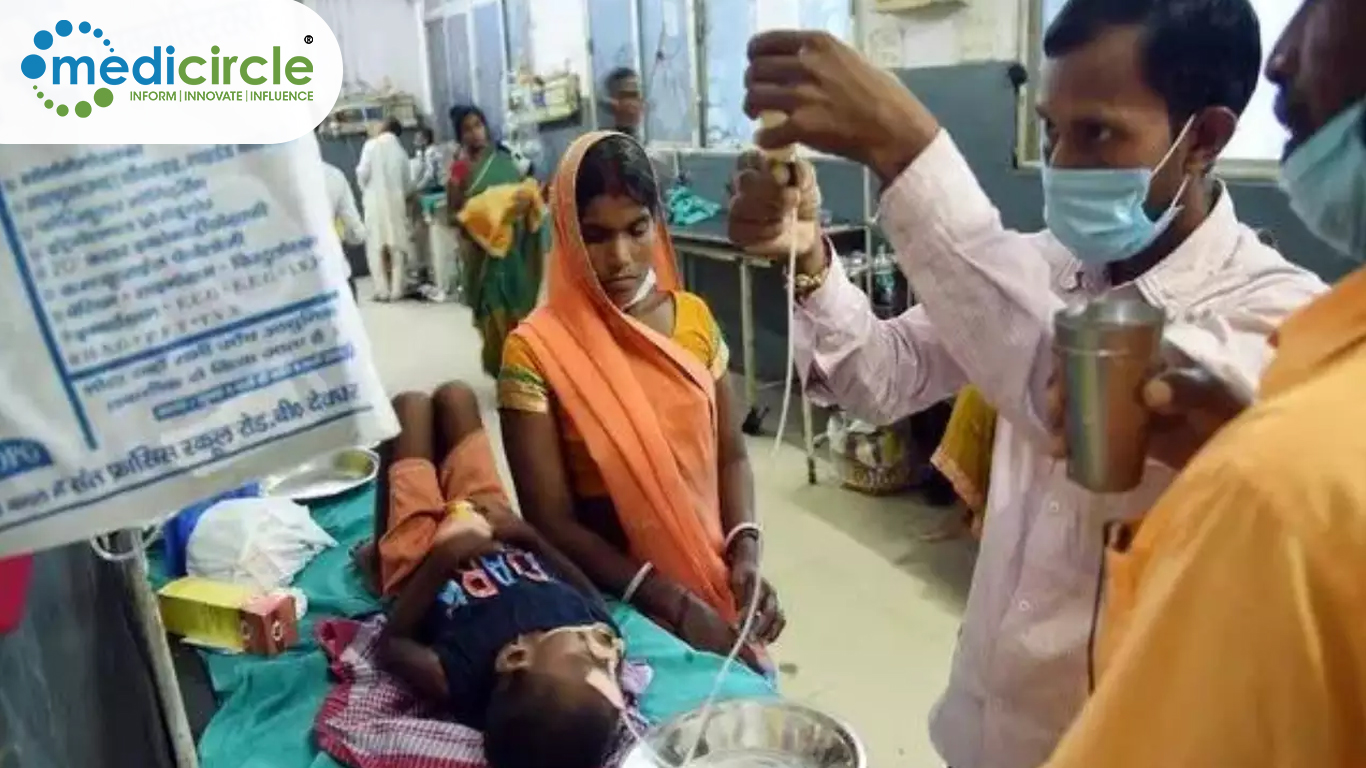An outbreak of Acute Encephalitis Syndrome (AES) has caused alarm in Gujarat and neighbouring states, significantly affecting children under 15 years old. Since early June, 148 cases have been reported: 140 in Gujarat, 4 in Madhya Pradesh, 3 in Rajasthan, and 1 in Maharashtra. Tragically, 59 children have died, with the Chandipura virus (CHPV) confirmed in 51 cases.
Government Response and Health Measures: In response to the crisis, a high-level review meeting was held, attended by key health officials including the Director General of Health Services (DGHS), the Director of the National Centre for Disease Control (NCDC), and the Director General of the Indian Council of Medical Research (ICMR). Officials from the affected states, members of the National Joint Outbreak Response Team (NJORT), and experts from various health institutes also participated.
Since July 19, there has been a noticeable decline in new AES cases, according to the Ministry of Health and Family Welfare. Gujarat has implemented several public health measures to control the outbreak, including insecticidal spraying to control vectors, public education campaigns, training for medical personnel, and ensuring that cases are referred promptly to specialized hospitals.
To support the Gujarat State Government, the NJORT has been deployed to assist with public health measures and conduct a detailed investigation into the outbreak. Additionally, a joint advisory from the NCDC and the National Centre for Vector Borne Diseases Control (NCVBDC) is being issued to guide neighbouring states reporting AES cases.
Understanding Chandipura Vesiculovirus (CHPV): Chandipura vesiculovirus (CHPV), a member of the Rhabdoviridae family, is associated with Chandipura encephalitis, an encephalitic illness in humans. First identified in 1965 from the blood of two patients in Chandipura village, Maharashtra, CHPV is known to cause sporadic cases and outbreaks in western, central, and southern India, particularly during the monsoon season. It is transmitted by vectors such as sand flies and ticks.
Currently, the only measures to combat CHPV are vector control, maintaining hygiene, and raising awareness. The Gujarat government has been proactive in implementing these measures to curb the spread of the virus. Insecticidal spraying has been intensified to control the vectors, and public education campaigns are underway to inform people about the importance of maintaining hygiene and taking preventive measures.
Medical personnel have received training to handle AES cases effectively, and efforts are being made to ensure that affected individuals are referred to specialized hospitals promptly. The NJORT’s involvement in investigating the outbreak and supporting public health measures is crucial in controlling the situation.
Raising awareness about CHPV and AES is essential to prevent future outbreaks. Communities need to be educated about the symptoms of AES, the importance of early detection, and the steps they can take to protect themselves from vector-borne diseases. Public health campaigns should focus on promoting hygiene practices, such as using insect repellent, wearing protective clothing, and ensuring clean living environments.
Additionally, community engagement is vital in controlling the spread of the virus. Local leaders and health workers should work together to disseminate information and encourage preventive measures. Schools can also play a role by educating children about the importance of hygiene and the risks associated with vector-borne diseases.
Early detection and prompt treatment are crucial in managing AES cases. Parents and caregivers should be aware of the symptoms, which include high fever, headache, vomiting, confusion, and seizures. If any of these symptoms are observed, medical attention should be sought immediately.
Healthcare facilities need to be equipped to handle AES cases effectively. This includes having trained medical personnel, adequate supplies of medications, and access to specialized care if needed. Early intervention can significantly improve outcomes and reduce the risk of severe complications or death.
Research plays a critical role in understanding and combating CHPV and AES. Continued efforts are needed to study the virus, its transmission patterns, and effective control measures. The collaboration between health institutes, research organizations, and government agencies is essential to develop better strategies for prevention and treatment.
Investment in research and development can also lead to the discovery of new treatments and vaccines. This would provide a long-term solution to prevent future outbreaks and protect vulnerable populations, particularly children under 15 years old.
The outbreak of Acute Encephalitis Syndrome (AES) in Gujarat and neighbouring states has highlighted the need for effective public health measures and community awareness. The proactive response by the government and health agencies, including vector control, public education campaigns, and early detection and treatment, is crucial in controlling the spread of the disease.
Raising awareness about CHPV and AES, promoting hygiene practices, and ensuring early detection and treatment are key steps in preventing future outbreaks. Continued research and collaboration are essential to develop better strategies for combating the virus and protecting vulnerable populations.

 First identified in 1965 from the blood of two patients in Chandipura village, Maharashtra, CHPV is known to cause sporadic cases and outbreaks in western, central, and southern India, particularly during the monsoon season. It is transmitted by vectors such as sand flies and ticks.
First identified in 1965 from the blood of two patients in Chandipura village, Maharashtra, CHPV is known to cause sporadic cases and outbreaks in western, central, and southern India, particularly during the monsoon season. It is transmitted by vectors such as sand flies and ticks.










.jpeg)


.jpeg)
.jpeg)
.jpeg)
_(1).jpeg)

_(1)_(1)_(1).jpeg)
.jpeg)
.jpeg)
.jpeg)








.jpeg)
.jpeg)